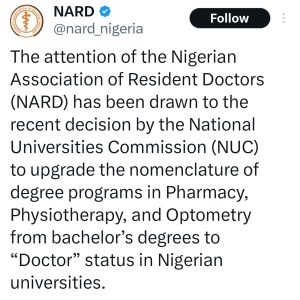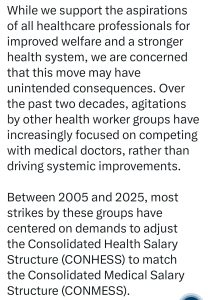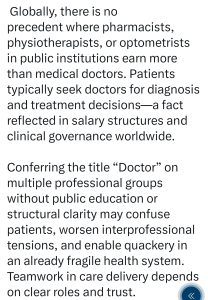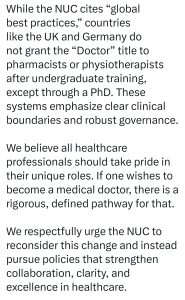The Nigerian Association of Resident Doctors (NARD) has voiced strong opposition to the recent decision by the National Universities Commission (NUC) to upgrade the degree titles of Pharmacy, Physiotherapy, and Optometry from bachelor’s degrees to the “Doctor” level in Nigerian universities.
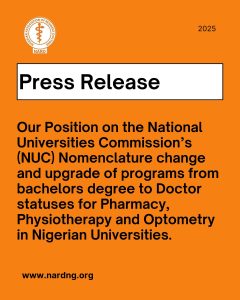
The upgrade, which took effect in January, was announced by the NUC as part of efforts to strengthen academic training and professional competence.
According to the Commission, the change aims to deepen clinical exposure, enhance foundational knowledge, and improve the practical readiness of graduates in these fields.
However, in a statement released on Thursday, May 9, via its official X handle, NARD warned that the new policy could lead to confusion within the healthcare system, exacerbate interprofessional rivalry, and encourage misrepresentation of professional roles.
“Conferring the title ‘Doctor’ on multiple professional groups without proper public education or structural reforms risks confusing patients, undermining trust, and encouraging quackery,” the association said. “In a system already grappling with weak regulation, teamwork is built on clarity, not title inflation.”
NARD also criticized what it described as a growing trend among non-physician healthcare workers to seek parity with medical doctors rather than advocating for systemic improvements that benefit patients.
The doctors further argued that globally, the roles of physicians remain distinct in terms of diagnosis and clinical decision-making, a fact that is typically reflected in professional hierarchies and compensation structures.
“Nowhere in public healthcare systems do pharmacists or physiotherapists earn more than doctors, nor are they regarded as primary diagnosticians,” the association stated.
While the NUC defended its decision as aligning with “global best practices,” NARD countered that in countries like the UK and Germany, the title of “Doctor” is reserved for individuals who complete a PhD or other advanced academic qualifications, not for undergraduates in allied health fields.
“We support respect and recognition for every health professional,” NARD concluded, “but inflating titles without reforming systems or clarifying scopes of practice only sets the stage for dysfunction.”
